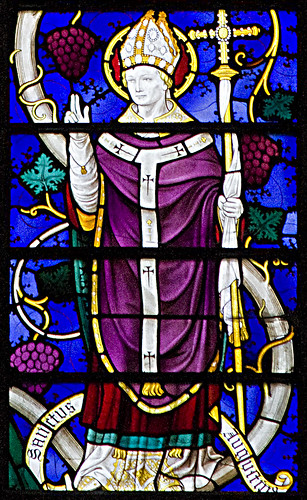St. Augustine of Canterbury

Stained glass image of St. Augustine of Canterbury, taken from Flickr.
(The following is excerpted from the 26 May entry in Volume VIII of the 1983 Marian House edition of the English translation of Dom Prosper Guéranger's 'The Liturgical Year' by the Benedictines of Stanbrook. 28 May was the feast day of St. Augustine of Canterbury on the traditional sanctoral calendar from 1882 on.)
"Augustine was a Monk of the Monastery of Saint Andrew, in Rome, where also he discharged the office of Prior with much piety and prudence. He was taken from that Monastery by St. Gregory the Great; and sent by him, with about forty Monks of the same monastery, into Britain. Thus would Gregory carry out, by his disciples, the conversion of that country to Christ - a project which he at first resolved to effect himself. They had not advanced far on their journey, when they became frightened at the difficulty of such an enterprise; but Gregory encouraged them by letters which he sent to Augustine, whom he appointed as their Abbot, and gave him letters of introduction to the kings of the Franks, and to the Bishops of Gaul. Whereupon Augustine and his Monks pursued their journey with haste. He visited the tomb of St. Martin, at Tours. Having reached the town of Pont-de-Ce, not far from Angers, he was badly treated by its inhabitants, and was compelled to spend the night in the open air. Having stuck the ground with his staff, a fountain miraculously sprang up; and on that spot a Church was afterwards built, and called after his name."
"Having procured interpreters from the Franks, he proceeded to England and landed at the Isle of Thanet. He entered the country, carrying, as a standard, a silver Cross, and a painting representing our Saviour. Thus did he present himself before Ethelbert, the king of Kent, who readily provided the heralds of the Gospel with a dwelling in the city of Canterbury, and gave them leave to preach in his kingdom. There was close at hand an Oratory which had been built in honor St. Martin, when the Romans had possession of Britain. It was in this Oratory that his queen, Bertha, (who was a Christian, as being of the nation of the Franks) was wont to pray. Augustine, therefore, entered into Canterbury with solemn religious ceremony, amidst the chanting of psalms and litanies. He took up his abode for some time near to the said Oratory; and there, together with his Monks, led an apostolic life. Such manner of living, conjointly with the heavenly doctrine that was preached, and confirmed by many miracles, so reconciled the islanders, that many of them with induced to embrace the Christian Faith. The king himself was also converted, and Augustine baptized him an a very great number of his people. On one Christmas Day he baptized upwards of ten thousand English, in a river at York; and it is related that those among them who were suffering any malady, received bodily health, as well as their spiritual regeneration."
"Meanwhile, the man of God Augustine received a command from Gregory to go and receive Episcopal ordination in Gaul, at the hands of Virgilius, the Bishop of Arles. On his return he established his See at Canterbury, in the Church of our Saviour, which he had built, and he kept there some of the Monks to be his fellow-labourers. He also built in the suburbs the Monastery of Saint Peter, which was afterwards called 'Saint Augustine's'. When Gregory heard of the conversion of Angli, which was told to him by the two Monks Laurence and Peter, whom Augustine had sent to Rome, he wrote letters of congratulation to Augustine. He gave him power to arrange all that concerned the Church in England, and to wear the Pallium. In the same letters he admonished him to be on his guard against priding himself on the miracles which God enabled him to work for the salvation of souls, lest pride should turn them to the injury of him that worked them."
"Having thus put in order the affairs off the Church in England, Augustine held a Council with the Bishops and Doctors of the ancient Britons, who had long been at variance with the Roman Church in the keeping of Easter and other rites. And in order to refute, by miracles, these men, whom the Apostolic See had often authoritatively admonished, but to no purpose, Augustine, in proof of the truth of his assertions, restored sight to a blind man in their presence. But on their refusing to yield even after witnessing the miracle, Augustine, with prophetic warning, told them of the punishment that awaited them. At length, after having laboured so long for Christ, and appointed Laurence as his successor, he took his departure for heaven on the seventh of the Calends of June (May 26) and was buried in the Monastery of Saint Peter, which became the burying-place of the Archbishops of Canterbury, and of several kings. The Churches of England honoured him with great devotion. They decreed that each year his feast should be kept as a holyday, and that his name should be inserted in the Litany [of the Saints], immediately after that of St. Gregory, together with whom Augustine has ever been honoured by the English as their Apostle, and as the propagator of the Benedictine Order in their country."


0 Comments:
Post a Comment
<< Home